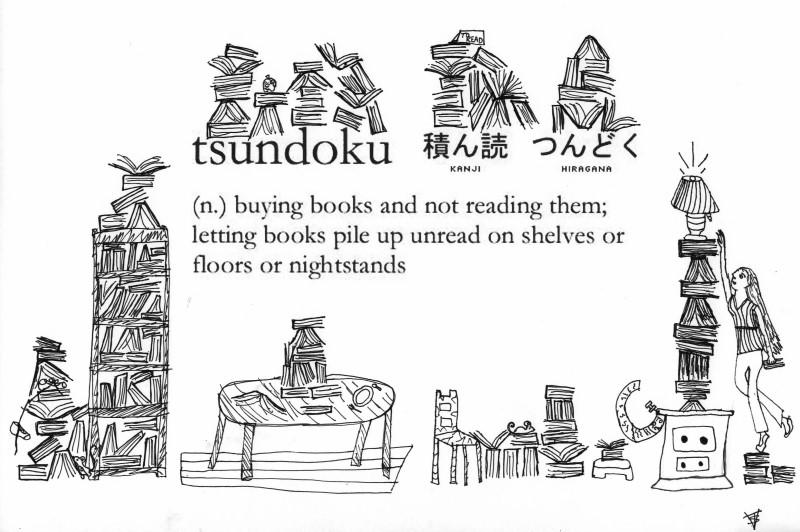
There are some words out there that are brilliantly evocative and at the same time impossible to fully translate. Yiddish has the word shlimazl, which basically means a perpetually unlucky person. German has the word Backpfeifengesicht, which roughly means a face that is badly in need of a fist. And then there’s the Japanese word tsundoku, which perfectly describes the state of my apartment. It means buying books and letting them pile up unread.
The word dates back to the very beginning of modern Japan, the Meiji era (1868–1912) and has its origins in a pun. Tsundoku, which literally means reading pile, is written in Japanese as 積ん読. Tsunde oku means to let something pile up and is written 積んでおく. Some wag around the turn of the century swapped out that oku (おく) in tsunde oku for doku (読) – meaning to read. Then since tsunde doku is hard to say, the word got mushed together to form tsundoku.
As with other Japanese words like karaoke, tsunami, and otaku, I think it’s high time that tsundoku enter the English language. Now if only we can figure out a word to describe unread ebooks that languish on your Kindle. E‑tsundoku? Tsunkindle? Contemplate the matter for a while.
The illustration above was made when a Redditor asked his daughter to illustrate the word “Tsundoku,” and she did not disappoint.
Note: An earlier version of this post appeared on our site in July 2014.
If you would like to sign up for Open Culture’s free email newsletter, please find it here. It’s a great way to see our new posts, all bundled in one email, each day.
If you would like to support the mission of Open Culture, consider making a donation to our site. It’s hard to rely 100% on ads, and your contributions will help us continue providing the best free cultural and educational materials to learners everywhere. You can contribute through PayPal, Patreon, and Venmo (@openculture). Thanks!
Related Content:
The Virtue of Owning Books You Haven’t Read: Why Umberto Eco Kept an “Antilibrary”
An Archive of Vividly Illustrated Japanese Schoolbooks, from the 1800s to World War II
Jonathan Crow is a Los Angeles-based writer and filmmaker whose work has appeared in Yahoo!, The Hollywood Reporter, and other publications. You can follow him at @jonccrow. And check out his art blog Veeptopus.


Although this is a repost of a post over a decade ago, I’m surprised with the little bit of misinformation still present. 積んでおく is shortened to 積んどく (tsundoku) in speech just like many contractions in English (like “gonna”). There was never a “swap out” of “oku” to “doku.” Saying Tsundeoku faster results in tsundoku, just like when saying going to/gonna in English. Also, “tsunde doku,” does not exist grammatically.